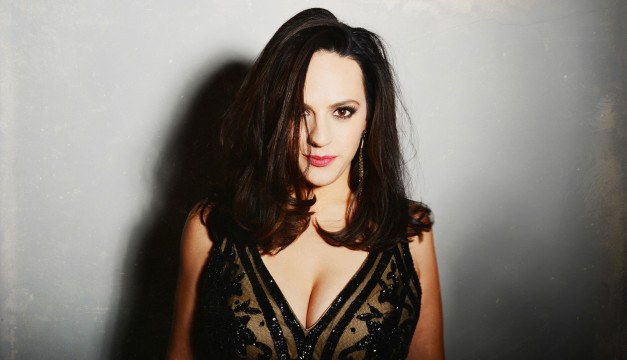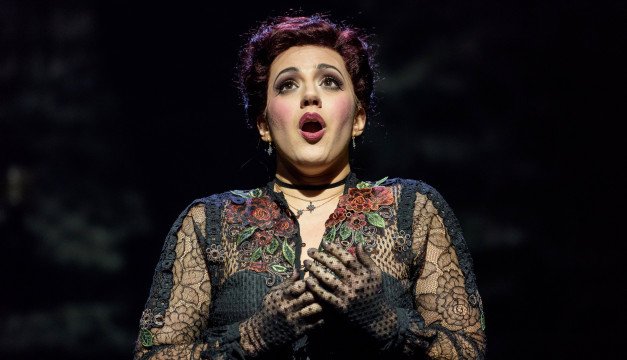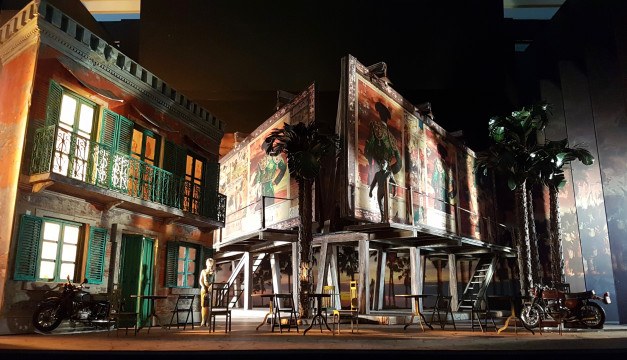Six Questions with Daniela Mack, Opera Philadelphia’s Carmen
Mack, who opened the season creating a new role, is now back in an iconic one.

Mezzo-soprano Daniela Mack. (Photo by Shervin Lainez)
Mezzo-soprano Daniela Mack, whose schedule takes her all over the United States and around the globe (she was a Cardiff Singer of the World finalist a few years ago), this season has made Philly—and our opera company—a particular destination. She opened the season—and the first-ever O Festival—creating the title role a new opera, Elizabeth Cree. It seems fitting that she should be back to close out the season in the most celebrated mezzo-role in the traditional repertoire—Bizet’s Carmen, of course. Via email, I asked Ms. Mack about these experiences and more.
- Anthony Roth Costanzo Is Here to Save Opera in Philly
- The Cocktail Making a ‘Buzz’ at Opera Philadelphia
- At Least Three Philly Gas Stations Are Now Using Opera to Fight Crime
- What Will Philly’s Arts Scene Look Like After a Year Without Audiences?
- Madonna Reviewed: Her Madame X Show at the Met in Philly Is a Beautiful Failure
Say a little bit about creating Elizabeth Cree, and opening the first O Festival.
It was exhilarating from start to finish, and one of the highlights of my career. In a field where most of the pieces I perform are about 200 years old, it’s an incredible luxury to be able to have an ongoing dialogue with the composer (ed. Kevin Puts) and librettist (Mark Campbell), who always welcomed collaboration with the singers for which they were composing, which was a real gift. The role of Elizabeth is meaty, dark, complex, and full of surprises, and was so much fun to discover. The icing on the cake was getting to open Opera Philadelphia’s inaugural O Festival with the piece. I truly believe in the innovative and important work that this company is doing, and I am so grateful to be a part of such an exciting season.
What was the moment you knew you wanted to be an opera singer?
I didn’t have an “aha” moment, but I had several events point me in the right direction. My parents took me to my first opera when I was seven years old (La Traviata) and it made an enormous impact on me. I loved the spectacle and grandeur. There was always classical music playing in our home, whether on the radio or my dad’s piano playing, so I had a familiarity with the sound of it from a very young age. I started as a pianist for years, but sang showtunes and Latin ballads at the end of each of my lessons with my teacher. At fifteen I had my first official voice lesson, and I was hooked.

Daniela Mack as Elizabeth Cree at Opera Philadelphia. (Photo by Steven Pisano)
What piece of advice have you gotten as a singer that you’ve found most helpful?
I’m fortunate to have supportive and wonderful mentors who have given me great advice. It’s in my nature to aim for perfection before sharing my work with others. That’s not always a bad thing, but the danger is that I become too careful, and that stifles spontaneous creativity. One phrase that has resonated with me is “the more you dare, the more you achieve.” It’s a mantra that clicked the minute it was said to me, and that I try to carry with me whenever I’m working on anything these days. As a young singer, I was afraid of making mistakes and not sounding polished, but as I get older I realize that imperfections are forgivable if there is a spark or excitement in the delivery. That is what has the potential to touch others, and it is certainly more satisfying as an artist to dare and to push one’s own boundaries than to play it safe. I find that I grow more as an artist when I allow myself to be daring.
If you had to trade singing voices with someone, who would it be—and what would you sing?
Ella Fitzgerald! I have always been mesmerized by her beauty of tone, her expression, and her incredible gift of improvisation. She made everything sound cool and exciting at the same time.
Having opened the Opera Philadelphia season with a new work, you are closing it with one of the most iconic roles in one of the most famous operas in the repertoire. Say something about the different challenges?
Opera Philadelphia has given me the incredible opportunity to open the season with one strong and complicated female lead whose story most people didn’t know, and now close it with another equally strong and complex—yet infamous—one. There is a wonderful sense of freedom that comes with creating a new role, since nobody has any expectations or pre-conceived notions about what it “should” sound like. One of the biggest challenges in portraying such an iconic role as Carmen is that everyone (myself included) has the sound or interpretation they want to hear in their head going into the performance. My personal goal is to absorb and process everything that I know and have heard from my favorite interpreters of the role, and then move past that and let my own instrument take over. I have to trust that my most honest performance will come about not because I emulate what I’ve studied, but because I allow my own voice to sing the character.

Set design by Gary McCann for Carmen Act II at Opera Philadelphia
I know this isn’t your first Carmen. What will be different about this production?… and how has your vision of the role changed with different directors?
I’ve been looking forward to working again with our fabulous director, Paul Curran. His attention to detail and knowledge of the text and the story’s historical context is incredible. It’s always invigorating to work with that kind of director because they challenge me to dive deeper into my character’s life and bring out more than just the surface-level plot. A piece like Carmen, which is so often performed the same old way, craves that kind of depth of interpretation if we are to present something that feels fresh. Our setting is in the 1950’s, in a blend of Spain, Miami, and Cuba, and focuses on the gritty yet extremely colorful world that they inhabit. It’s a time period that is familiar enough to be relatable for today’s audience. I’m excited to share what is sure to be a beautiful production!
Opera Philadelphia’s Carmen has performances on April 27 and 29, and May 2, 4 and 6. For more information, visit the website.


